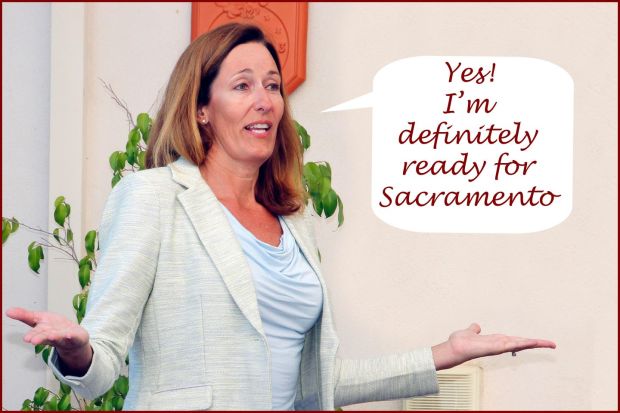
When I walk into a room with my husband, some people just presume that he’s the mayor, jokes Janice Parvin, the mayor of Moorpark.
We both laugh as she shares the story. Yet, Parvin’s an experienced leader, having served 6 years as a councilwoman. She’s currently in her third term as mayor, and running for re-election.
It’s not a frivolous matter. America still struggles to have a fair representation of women in politics.
Jacqui Irwin of Thousand Oaks is running for State Assembly where less than a quarter of the legislators are women. Last weekend, she assembled a group of female political leaders from Ventura County, in the run up to the election. It was not a feminist statement. Even a male supporter, sitting by my side, said that putting more women in leadership positions makes sense – they handle “nonsense” better, he joked.
While we can’t make categorical statements that women would make better leaders than men, there has been much written about the caring, empathetic, and multi-tasking nature of women that could translate well in public office. Women have a fair bit of experience when it comes to family, childcare, education, and health, which is at the crux of governing and policy.
Democratically, women ought have more significant representation, given that they constitute 50.8 percent of the population.
So, I decided to look up some statistics on just how many women does America have in political office? It’s shocking low.
There are only five states with female governors: Arizona, New Mexico, Oklahoma, South Carolina, and New Hampshire. 24 states have not had a female governor ever in their history. State legislative bodies have less than 25 percent women, nationally. Only 12 of America’s largest 100 cities have female mayors.
As a whole, America now ranks 98th in a global listing for the percentage of women in national legislatures. That’s down from 1998, when we were placed 59th. We’re behind Kenya, Indonesia, and just slightly ahead of the UAE. (The number one spot belongs to Rwanda, a country that lost most of its men in the 1994 genocide and has been rebuilt by large number of women in the last two decades).
Which countries did well? Once again, it’s the Scandinavian nations that came out on top. Sweden has 45 percent female political leaders; Finland, 43 percent; Denmark and Netherlands with 39 percent. Germany is not far behind at 36.5 percent.
Some experts correlate the high number of female political leaders in Scandinavia with their child care practices. Because families, and especially new mothers, are given flexibility in their work schedules, it makes it easier to manage a political career.
At Irwin’s gathering, several female leaders pointed to family life as one of the biggest hurdles for getting more women into politics. How can you spend the entire week in Sacramento, if you have young kids and a family to tend to in your hometown? Irwin is not new to the game. She’s mastered the art as a former councilwoman and mayor of Thousand Oaks.
Juggling family life and a career is not exclusive to politicians. Of course not. Corporate careers are highly demanding as are jobs that require you to work night shifts or long hours (think medicine). Parvin notes that this is not a new battle. As a child, she recalls her my mother rallying for equal pay. She worked as a nurse and she was constantly trying to get better wages for women, she says.
Yet, it seems to be a catch-22. We need more women in legislative roles to help pass more balanced policies on child care, family life, wages. But, if men are dictating the game, that’s hard to do.
So, what is the solution? Irwin and Parvin had similar answers. While institutional changes are harder (and take longer, especially in bureaucracies), the simplest solution right now is focusing on younger women who are interested in politics, but perhaps hesitant. Encouraging them to participate, showing them the ropes, sharing your experiences – that’s the only way to create a change, even if it means seeing the benefits a generation later.
While it may seem obvious, our media doesn’t always do a good job of expressing the need for female participation in politics. In fact, just this week, Fox News presenter Kimberly Guilfoyle made the most ghastly comment about young women. She said, they should not vote or sit on juries because they lack life experience. Instead, they should go back to Match.com or Tinder, online and mobile dating sites.
To be precise, she said, “They’re like healthy and hot and running around without a care in the world.” And they should stay like that — till they get older and wiser. Oh dear.
In contrast, programs such as Ready to Run are making serious attempts to bridge the gender gap in politics. The non-partisan program is designed to introduce women to the nuts and bolts of political life: how to fundraise, how to assemble a team, how to manage a career with a political campaign. And they’re relying on existing female political leaders to provide mentoring.
This year, a study by Political Parity, a non-partisan organization trying to rally more women into politics, said that in addition to family life, one of the biggest challenges for women is fundraising and plugging into the power networks to get access to lists of donors. This is where mentoring needs to go into play. If we can get existing female political leaders to support up-and-coming women, such hurdles can be overcome.
This originally appeared in the Ventura County Star.
Photo Courtesy of Jacqui Irwin.




